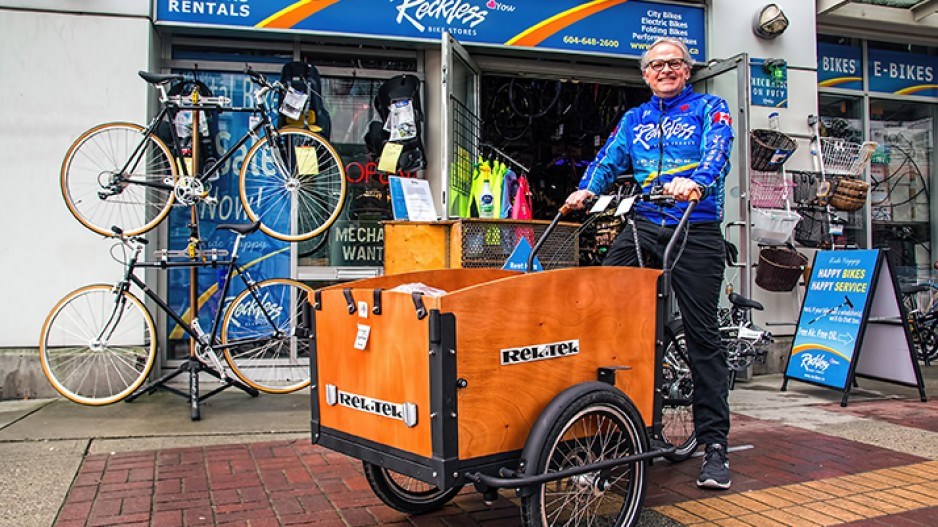Metro Vancouver businesses catering to outdoor activity that’s conducive to social distancing – biking, inline skating and solo jogging – say they are seeing some uptick in business since the COVID-19-induced isolation measures began in March, but how that’s helping bottom lines overall has varied greatly from sector to sector.
The Hockey Shop Source for Sports in Surrey, for example, is one of the few ice hockey equipment stores in the Lower Mainland that maintained sales of inline skates and roller skates, and store manager Darryl Holt said sales of those goods (and other off-ice training products) are now making up about 90% of the store’s sales – up from single-digit percentage shares during typical hockey seasons.
“We are one of the last stores that still sell inline products today,” Holt said. “Most people walked away from selling that stuff a few years ago because inline hockey isn’t a huge thing anymore. But we’ve always been one of the last few places where you can get that, and we are getting that business now because we’ve stayed in that market.”
In Vancouver, Reckless Bike Stores owner Paul Dragan said business at its Yaletown location has remained brisk. Dragon said he has seen many people drag their bikes out of storage for repairs, while sales for entry-level and used bikes in the $500-to-$700 range have jumped – showing people are looking to get outside while still being aware of the likely financial constraints most Canadians will face in the coming months.
One advantage bikes stores have, Dragan said, is the need for bike maintenance – something that is usually done at a bricks-and-mortar location.
“You can buy a bike from Amazon [Nasdaq:AMZN], but it doesn’t put air in the tires.”
He added that he is eager for the province to follow the lead of Ontario and New York if it does decide to shut down non-essential services to stop the spread of COVID-19, because those jurisdictions have listed bicycle repair shops as essential service.
“Biking ticks a lot of boxes,” Dragan said. “It’s mental health, it’s physical health, and it’s transportation. And if I’m riding with my wife, that’s one thing, but if I’m riding with most people, it’s either staying back or going ahead. So it’s a little easier to distance yourself when you are on the seawall, for example…. In a city like Vancouver, we are important; bikes are a part of people’s lives here.”
The news is less rosy on the running footwear sector.
Peter Butler, who owns Vancouver’s Forerunners retail store with his wife, said business is down at least 50% in the weeks since self-isolation measures began in B.C. While there may be a spike in the number of people wanting to go outside and run, it isn’t enough to offset the dramatic decline in walk-in customer traffic, as the store limits the number of customers to the number of employees on the premises.
“[Social distancing] has probably pushed business a little bit, but I think most people are just trying to get enough money to eat their next meal,” said Butler, who is visibly frustrated at his store’s difficulty in accessing provincial and federal aid programs for small and medium-sized businesses. “It’s all an unknown at this point. How long is this going to last? Is this going to kill the whole economy? Is everyone going to be on the street?
“The best-case scenario is if we are still a business in three months.”
While not in as dire a situation, The Hockey Shop’s Holt agreed that the uncertainty facing outdoor lifestyle stores is the same facing all retailers given the scope of the COVID-19 pandemic and its impact. The store is now closed to walk-in traffic and is conducting sales 100% online, and Holt said he will likely reduce the workforce by 90% soon through temporary layoffs until walk-ins can return.
“I’m 100% optimistic we can stay in business,” Holt said. “We have the reach; we have only laid off our workers temporarily, and they can come back to their jobs. What I can’t prepare for is whether the people are going to come back and spend like they used to spend. That’s the reality.
“We’ve survived the worst recessions without much of a hit. We’ve always found that Canadians will always find hockey as a base to gather and be part of the community, so if this was just a financial crisis, I wouldn’t even be questioning anything. But we are talking about a health crisis; how are people going to react to being in dressing rooms and sweating when we’ve been told to be away from each other? So I don’t know, and that’s a problem.”
Dragan, however, is more optimistic.
“In terms of being a business, when it’s bad, we are not really bad and when it’s good we are not necessarily very good,” he said. “We’ve been through everything in the past 30 years from incredible recessions to incredibly good times. The internet was going to kill us 20 years ago, and it hasn’t done that yet. Then if was going to be Amazon killing us, and that also hasn’t happened yet. People can only watch so much Netflix. They need to go out and exercise.”




